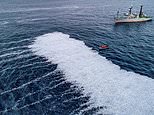Dutch trawler dumps 100,000 dead fish off the coast of France
Huge Dutch trawler dumps 100,000 dead fish off the coast of France: Campaigners accuse owners of ditching fish to avoid EU rules – but they claim the ‘net broke’
The blue whiting are a subspecies of cod used in fish fingersThey were dumped by world’s second-largest trawler off west coast of France, prompting outrage among campaignersDutch owner of FV Margiris said it was a ‘rare’ accident – caused because the sheer weight of the haul caused the net to ruptureActivists at Sea Shepherd France claimed the trawler simply dumped fish it did not want to process, in breach of EU rules
<!–
<!–
<!–<!–
<!–
(function (src, d, tag){
var s = d.createElement(tag), prev = d.getElementsByTagName(tag)[0];
s.src = src;
prev.parentNode.insertBefore(s, prev);
}(“https://www.dailymail.co.uk/static/gunther/1.17.0/async_bundle–.js”, document, “script”));
<!–
DM.loadCSS(“https://www.dailymail.co.uk/static/gunther/gunther-2159/video_bundle–.css”);
<!–
These shocking images show the Atlantic covered in a carpet of more than 100,000 dead fish.
The blue whiting, a subspecies of cod used in fish fingers, were dumped by the world’s second-largest trawler off the west coast of France, prompting outrage among campaigners.
The Dutch owner of FV Margiris said it was a ‘rare’ accident – caused because the sheer weight of the haul caused the net to rupture.
But activists at Sea Shepherd France claimed the trawler simply dumped fish it did not want to process, in breach of EU rules.
The group’s head, Lamya Essemlali, said: ‘The temptation is big for these vessels at sea without any witness, any control, to just throw overboard all the bycatch [fish they did not mean to capture] and stay in the area, and keep on fishing.
Campaigners from Sea Shepherd, with their own vessel in the background, survey the massive catch dumped by FV Margiris off the French coast. Trawlermen say their net burst in a ‘rare’ accident
The blue whiting, a subspecies of cod used in fish fingers, were dumped (above) by the world’s second-largest trawler off the west coast of France. Activists at Sea Shepherd France claimed the trawler simply dumped fish it did not want to process, in breach of EU rules
‘There is total impunity at sea. There are no fines. There is a lot of money to be made and we have to improve the controls at sea, we have to put cameras on board all the fishing vessels.
‘It has an impact on the fish population itself but also it has an impact on the predators, like dolphins, because the fish that these super-trawlers are fishing are the main preys of dolphins and sharks. Basically, we are driving dolphins to starvation.’
But a statement issued by trade group the Pelagic Freezer-Trawler Association said the fish – which spread across 32,000 square feet off the coast of La Rochelle – had been ‘involuntarily released’ due to a rupture in the net ’caused by the unexpectedly large size of the fish caught’.
The industry body said the loss had been properly reported in line with EU law, and the fish ‘which is of great value to our members’ would be deducted from the vessel’s quota, reducing what owners Parlevliet & Van der Plas could catch in future.
‘It is not in our members’ interest to lose any fish they take on board,’ it added.
French environmental activist Lamya Essemlali said the size of Margiris – 14 times larger than most trawlers – previously caused such controversy in Australia that the government changed fishing rules, and it left the country having never caught a single fish. (Above, file photo of the trawler)
‘And we regret that this fish will now not be available for human consumption.’
France’s maritime minister, Annick Girardin, called the images ‘shocking’ and said she had asked for an investigation
Trawlers such as Margiris use drag nets more than 1,000 yards long, then process the fish in on-board factories, a practice criticised by environmentalists.
Ms Essemlali added the size of Margiris – 14 times larger than most trawlers – previously caused such controversy in Australia that the government changed fishing rules, and it left the country having never caught a single fish.
It was then sold to its Dutch owners, who now operate it under a Lithuanian flag.
France’s maritime minister, Annick Girardin (above), called the images ‘shocking’ and said she had asked for an investigation
![]()


